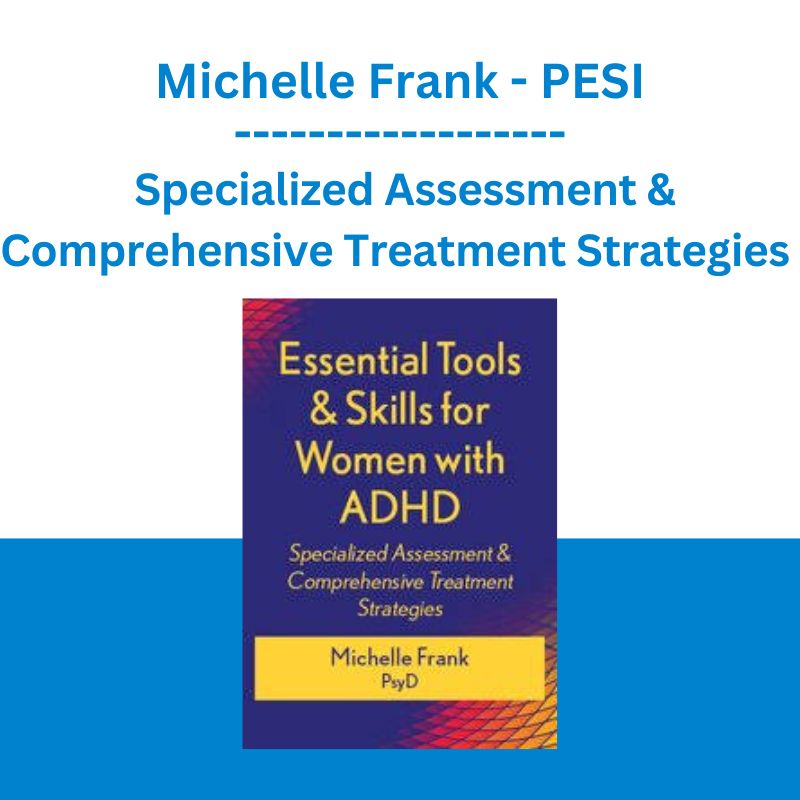*** Proof of Product ***
Exploring the Essential Features of “Essential Tools & Skills for Women with ADHD: Specialized Assessment & Comprehensive Treatment Strategies – Michelle Frank – PESI”
While it’s easy to miss an ADHD diagnosis in your female clients… these missed or late diagnoses can destroy your clients’ lives.
It doesn’t have to be this way… you can be a part of the solution.
Help your female clients by getting expert training that gives you concrete, how-to interventions to overcome biases in research, assessments, society and even your own perception of what ADHD symptoms “should look like.”
Join renowned therapist and author Michelle Frank, PhD and elevate your skill set in assessment, diagnosis and treatment of complex comorbidities particular to women. In this comprehensive training you’ll explore:
- The impact of pregnancy, motherhood, PMDD, hormones & other biological processes on ADHD
- How to help clients prevent risk factors like SUDs, domestic violence & more
- Gender roles and how they influence perception of ADHD
- Treating co-occurring conditions such as eating disorders, depression, suicidality & more
- Redefining treatment goals to increase self-esteem and self-efficacy
Women with ADHD have gotten the short end of the stick for far too long… Sharpen your skill set and stop missing important cues!
Speaker
Michelle Frank, PsyD
Dr. Frank is a clinical psychologist currently practicing at Enrich Relationship Center of Colorado in the Denver-metro area. She specializes in diagnosing and treating ADHD, particularly in women. She is co-author, along with Sari Solden, MS, of the book A Radical Guide for Women with ADHD: Embrace Neurodiversity, Live Boldly, and Break Through Barriers. In addition to individual clinical work, Dr. Frank Provides Gottman Method Couples’ Therapy to couples impacted by ADHD. With a passion for advocacy, outreach, and education, Dr. Frank regularly contributes to national ADHD conferences and support programs. Dr. Frank is former vice president of ADDA – an international nonprofit organization supporting adults with ADHD. She is a member of APSARD – The American Professional Society of ADHD and Related Disorders. She graduated from the Chicago School of Professional Psychology and Marquette University.
Speaker Disclosures:
Financial: Michelle Dougher Frank has an employment relationship with Enrich Relationship Center of Colorado. She receives royalties as a published author. Michelle Dougher Frank receives a speaking honorarium and recording royalties from Psychotherapy Networker and PESI, Inc. She has no relevant financial relationships with ineligible organizations.
Non-financial: Michelle Dougher Frank is a member of the Attention Deficit Disorder Association and the American Professional Society of ADHD & Related Disorders.
Objectives
- Build competence in identifying possible ADHD in women to make any necessary referrals and/or provide basic psychoeducation to a client.
- Appraise the complexity of how ADHD presents in women.
- Assess 3 common areas of concern or distress/impairment for women with ADHD seeking therapy.
- Differentiate comorbid conditions from ADHD symptoms to apply appropriate treatment interventions.
Outline
- ADHD in women is commonly misdiagnosed and dismissed
- Prevalence & Presentation
- Discrepancies in diagnoses
- Historical underrepresentation in research
- Biases in scales & persons
- Compensatory behaviors in girls – perfectionism
- Hormonal challenges
- Impact of “later in life” diagnosis
- Prescription medication increases
- ADHD in women in color
- Symptom Presentation in Women
- Qualitative and phenomenological vs quantitative differences
- Assessment – overcome traditional biases
- Internalizing vs externalizing behaviors
- ADHD “types”
- “Space Cadet”
- “Chatty Cathy”
- Co-occurring conditions
- Depression, anxiety, PMDD, eating disorders
- Gender Roles & ADHD
- Intersection of gender role constructs and ADHD challenges
- Impact on executive functioning
- Gender roles & the perception of ADHD
- Motherhood
- “How can I have children when…”
- Increased EF demands and constraints
- Common challenges
- Sensory overload
- Boredom
- Creating and maintaining structure, consistency
- Organization, memory
- Under- and over-stimulation
- Asking for help
- Hormones & ADHD
- Estrogen & Dopamine
- PMS & PMDD
- Pregnancy & medication?
- Menopause
- “Is this early-onset dementia?!”
- Common interventions
- Why Diagnosis & Treatment Matters – Risk Factors for Girls & Women with ADHD
- Suicidality and self-harm
- Low self-esteem
- Unwanted pregnancy, STIs
- Bullying, peer victimization
- Domestic violence and abuse dynamics
- Substance abuse
- Chronic pain, migraines, poorer health outcomes
- Common Presenting Concerns
- “The Emotional Legacy of ADHD”: Shame and Loss
- Anxiety, depression, emotional dysregulation
- Rejection sensitivity
- Negative self-talk, poor self-concept
- “I’m too much and not enough”
- Disordered eating, brain and body shame
- Perfectionism, over-compensation becomes rigid
- Relational impacts: Friendships, partners, motherhood
- Academic and career concerns
- What do I really want and how do I do it with ADHD?
- Trauma
- Treatment Considerations
- Redefining goals
- Functional vs symptom improvement
- Becoming more of self vs becoming more neurotypical
- Cultural considerations & intersectionality
- Validation & Psychoeducation
- Unravel internalized messages
- Addressing the emotional legacy of ADHD
- Managing unhelpful thoughts, rumination
- Assertiveness training
- Emotional regulation work
- Self-compassion work
- Barriers to treatment – stigma, finances, ADHD myths
- Limitations of the research and potential risks
- Limited research on hormones, hard to study
- Limited research on women of color
- Limited research on trans and non-binary individuals
- Limited research on female-specific treatment modalities and outcomes
Target Audience
- Counselors
- Social Workers
- Psychologists
- Marriage and Family Therapists
- Speech-Language Pathologists
- Teachers
- School Administrators
- Addiction Counselors
- Occupational Therapists
- Occupational Therapy Assistants
- Nurses
- Physicians
Please see the full list of alternative group-buy courses available here: https://lunacourse.com/shop/









